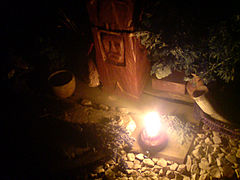Kupala Night

Kupala Day (Feast of St. John the Baptist; Russian: Иван-Купала; Belarusian: Купалле; Ukrainian: Івана Купала; Polish: Noc Kupały or Noc Świętojańska) is celebrated in Poland, Russia, Belarus and Ukraine currently on 7 July in the Gregorian or New Style calendar, which is 24 June in the Julian or Old Style calendar still used by many of the Orthodox Churches. Calendar-wise, it is opposite to the winter solstice holiday Korochun.
Some early mythology scholars, such as Sir James Frazer, claimed that the holiday was originally Kupala a pagan fertility rite later accepted into the Orthodox Christian calendar. There are analogues for celebrating the legacy of St. John around the time of the summer solstice elsewhere, including St. John's Day in Western Europe.
The Russian name of this holiday combines the words "Ivan", the Russian name of John (the Baptist), and Kupala, a word derived from the Slavic word for bathing. The latter refers to the tradition of John's baptizing people through full immersion in water and therefore with the his title of the Baptist. However, some sources indicate that Kupala was a name of a pre-Christian Slavic god or goddess.
The holiday is still enthusiastically celebrated by Polish and Russian youth. The night preceding the holiday (Tvorila night) is considered the night for mischiefs (which is a great concern for law enforcement agencies). On Ivan Kupala day itself children are engaged in water fights and perform pranks mostly involving pouring water over someone. In some regions, Ivan Kupala Day is considered the first day of the swimming season, when the water of lakes and rivers becomes warm enough.
Folklore and Slavic Religious beliefs

Many of the rites related to this holiday within Slavic religious beliefs, due to the ancient Kupala rites, are connected with the role of water in fertility and ritual purification. Youths would jump over the flames of bonfires. Girls would float wreaths of flowers often lit with candles on rivers and would attempt to gain foresight into their relationship fortunes from the flow patterns of the flowers on the river. Men may attempt to capture the wreaths, in the hope of capturing the interest of the woman who floated the wreath.
There is an ancient Kupala belief, that the eve of Ivan Kupala is the only time of the year when ferns bloom. Prosperity, luck, discernment and power would befall on whomever finds a fern flower. Therefore, on that night village folks would roam through the forests in search of magical herbs and especially the elusive fern flower.
Traditionally, unmarried women, signified by their garlands on their hair, would be the first to enter the forests. They are followed by young men. Therefore, consequent to the quest in finding herbs and the fern flower may be the blooming of relationships between pairs of men and women within the forest.
It is to be noted that biologists have held the persistent scientific fact that ferns have never and will never bloom.
In Gogol's story The Eve of Ivan Kupala a young man finds the fabulous fern-flower but is cursed by it. Gogol's witches' sabbath on the Eve of Ivan Kupala inspired Modest Mussorgsky to compose his Night on Bald Mountain.
See also
- Fête St-Jean-Baptiste
- Festival of San Juan
- Saint Jonas Day
- St John's Day (Estonia)
- Wianki (Poland)
- Kupala | Kupolė | Midsummer | Pirogovo | Jāņi |
- Semik — a related spring holiday.
- Yanka Kupala — the pen-name of this Belarusian author references his birthday on July 7.
